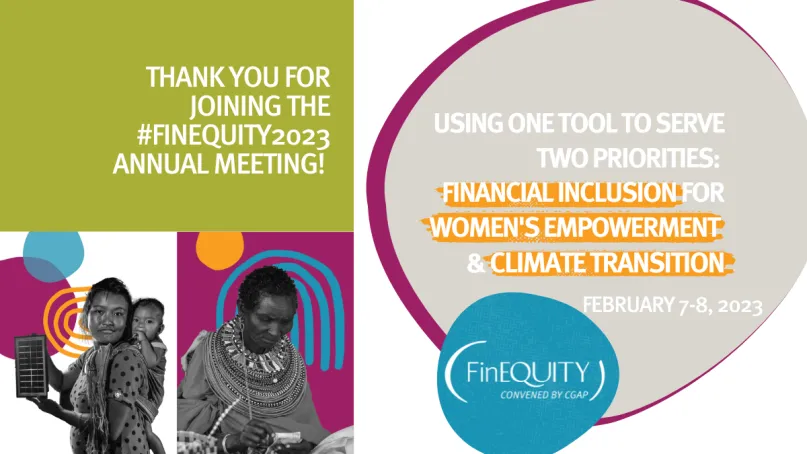#FinEquity2023 Annual Meeting

KEY TAKEAWAYS
Check out the #FinEquity2023 blog series for key takeaways from the Annual Meeting:
- Top Five Takeaways From the #FinEquity2023 Annual Meeting
- Setting FinEquity's Next Agenda: We Want Your Input!
- Empowering Women to Face Climate Change: How Can We Create Awareness of Financial Products and Services That Meet Women’s Needs?
RECORDINGS
If you missed the #FinEquity2023 Annual Meeting, you can now stream all session recordings of the event from home:
- Keynote Speech and Opening Discussion
- Member-Led Session 1: Designing products that address women's financial needs to combat climate challenges
- Member-Led Session 2: Influencing behaviors to address climate challenges with women's financial inclusion
- Member-Led Session 3: Improving outcomes for women affected by climate challenges through financial inclusion
- Panel Discussion: Regional perspectives on financial inclusion for women's empowerment and climate transition
- FinEquity 2023 Global Consultation
- FinEquity 2023 Closing Session
PRESENTATIONS
View presentations from each of the #FinEquity2023 Annual Meeting sessions.
AGENDA AND SPEAKERS
View the #FinEquity2023 Agenda and Speaker List.
EVENT BACKGROUND
Over the past four years, FinEquity has grown to a global community of over 6,000 researchers, practitioners, policymakers, and donors globally prioritizing women's financial inclusion. This signals the strong momentum for reaching a world where women have the capabilities to access, negotiate, and control financial services that improve their lives. However, the growing stress of climate change may potentially distract the development community from its focus on gender equality. FinEquity’s 2023 Annual Meeting brought together the community to talk about why and how a relentless focus on women is needed in times of increasing climatic stress—women are the first victims of climate change, and they have a crucial part to play in a fairer climate transition.
Women have unequal access to land ownership, high dependency on natural resources, limited mobility and overrepresentation in the informal economy, which make them particularly vulnerable to climate change (UNDP, 2016) (OIT, 2019). Climate change also tends to raise the burden of domestic work and the frequency of school dropouts, aggravate risks of gender-based violence and early forced child marriage, and increase mortality rates (UN Women, 2022) (Green Climate Fund, 2022) (Castañeda Camey, Sabater, Owren, & Boyer, 2020).
Women have unequal access to land ownership, high dependency on natural resources, limited mobility and overrepresentation in the informal economy, which make them particularly vulnerable to climate change.
While the poorest and women suffer disproportionately, they have the smallest margins and least access to resilience strategies that can help them avoid, absorb, and adapt to climate shocks. Access to a range of generic financial services such as savings and remittances can help smooth consumption during periods of drought or help speed recovery after a climate shock, thereby increasing resilience to climate change. However, other types of products can have a greater impact if they are specifically designed for climatic risks.
For example, access to credit can support livelihood adaptation through the adoption of climate-resilient agricultural practices while PAYGo services make it possible to engage directly in the climate transition by investing in greener assets or cleaner energy. However, designing products to mitigate climate risk and build resilience is inherently complex, data is limited, and costs may be high (Sirtaine, 2022).
FinEquity’s 2023 Annual Meeting (see agenda) provided an opportunity to explore the nexus that links financial inclusion, women’s empowerment, and climate change, with the purpose of understanding how financial services can help women adapt their livelihoods to erratic rainfall patterns and rising temperatures to mitigate climate risks. FinEquity members shared experiences highlighting how financial service providers are serving women’s climate-specific savings, credit, risk mitigation and non-financial needs, helping to increase household resilience and income.
FinEquity’s 2023 Annual Meeting provided an opportunity to explore the nexus that links financial inclusion, women’s empowerment, and climate change.
The sessions also addressed the barriers that may impede women's adoption and use of climate-smart financial services. Space was given to discuss the constraints that financial service providers, market actors, financial regulators and policymakers face or anticipate facing when serving the women’s market. The 2023 Annual Meeting brought together stakeholders to build a common understanding of the challenges, share experiences and lessons on using financial inclusion to advance gender equality and the climate transition, and identify ways in which FinEquity can continue to best support its community. We also hope this served as the beginning of a conversation with the community about how we can advance our collective efforts.


FinEquity is convened by CGAP, a global partnership of more than 30 leading development organizations that works to advance the lives of poor people, especially women, through financial inclusion.
If you were unable to join us for our last Annual Meeting, you can explore presentations and materials here.
Pour voir cette page en français, cliquez ici.
Para ver esta página en español, haga clic aquí.
About this event
Online